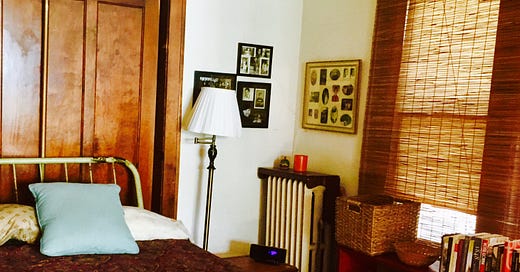As I read over what I have so far written about my first days in Loring Park, I see, not for the first time, how lucky I have been. We often don’t notice our luck along the way, or see it only in glimpses, seldom fully recognizing our good fortune until much later. That certainly was how it went with me.
Throughout this time, I worried. Would I be asked to visit enough schools? Would I be assigned an extra class at Metro State next semester? Could I handle the work load? Trying to write, trying to cultivate both the administration at Metro State and the staff at COMPAS, making time to grade piles of essays or comment with a cartoon on 100 or so stories the weeks I visited a school, doing all I could to help my Tibetan friends, creating flyers and mailing lists for independent marketing—all of that weighed on me. Money worries, too. Always money worries. I cherished and badly needed my solitary writing and walking time every day, but my life demanded that I burn creative energy on a wide range of tangential issues to survive.
In other words—though I liked to think of myself as a free-spirited bohemian nonconformist living an artist’s life—I was just like everybody else.
And of course there were my demons. So many demons. Anger. Money. Jealousy that others were getting noticed while I was not. We all have them, though not all demons are created equal, as I’m sure I’ve written elsewhere. But I was lucky. Schools liked me. Metro State gave me more than enough to do, and I could roll out of bed each morning and return to India for those hopeful few writing hours. Everything else could be at least temporarily blocked out. The chapters were lining up to tell the story of how my default emotions—anger and insecurity—twisted so much of my experience. My demons joined me at my desk, actually providing most of the material as my over-reactions to the people and situations in the story made me ridiculous even to myself.
And, little by little, through those hours and hours of alone time, the little stories making up the big story emerged. My first morning in Gaya popped out at me from my notes. The loud, arrogant Dutchman in the restaurant and the waiter who couldn’t get our order right. My anger at both and the infuriating truth of what that obvious jerk said to me found rhythm and form in the rewriting. I laugh even now when I recall that morning, the butt of my own joke. A slow motion nervous breakdown had taken me back to India and there that was, too, in my notes. The absurdity of it embarrassed me to write, but it had to be told. I could have been more confessional—heaven knows I had plenty to confess—but I made the situation clear without telling all my secrets. Then there was the Englishman, Harry, and what I called “the education tent.” I love that story because it captures exactly what my journey was about. Harry’s words about the type of tight-assed academician he had rejected—“big, strong brain and teeny, tiny little heart”—rings as true today as it did then. What later became Very Bad Buddhist was taking shape.
Which is not to say it came together easily. It didn’t, but the process excited me. My phone often rang as I worked, but I ignored it. Still in my pajamas, one ear cocked to the answering machine, I kept to the task. If the call came from someone offering me a teaching gig, fine, I’d call back later, but writing time was writing time. Even at that, no matter my dreams of being lifted from obscurity by this piece of work, I had to remember that the chances of my little book finding its way into print were slim. That, dear reader, is the reality that creative writers must live with.
Or, better, make their peace with.
It’s the old question. What are you writing for? Why do you write?
I don’t have a good answer for that question. I do know, however, that I feel more like myself when I am making something I can step back from and look at with the knowledge that I’ve imagined it into being. Charles Frazier, who wrote the wonderful novel Cold Mountain, once said in an interview that you write what you would be proud to have unpublished in your desk drawer. He has it about right. Something in you wants, or needs, to write, and so you write.
Finding a publisher is a separate task, although I did have a vague idea of who my readers might be. They might be people interested in Buddhism. Okay. My book would give them some of what I thought of as “Buddhism lite.” They might also be people interested in getting a window onto enlightenment-seeking Westerner shenanigans in the “Mystic East.” They might also be readers of memoir. Again, my ideas were vague, but I believed that I could sell the book. I’m a good talker and an accomplished oral storyteller, so why not?
So I nurtured my solitude, my writing and walking time, walled it off from the rest of my life in a guarded faith. My book became my friend. I confessed to it. Dreamed with it. Told it stories. Escaped to it. Once a section was roughed out, I returned to the first sentence and began to revise, pulling sentences apart and reassembling them, moving paragraphs, replacing verbs, sharpening dialogue. A car horn outside on the street, the caw of a crow, or a motor scooter’s buzzing oddly, pleasantly, put me right back in India and kept me going. Walking after writing, my head remained in that solitary place that only making lunch and returning a phone call could pierce. The next morning’s session couldn’t come too soon. How lucky I was to have my solitude.



